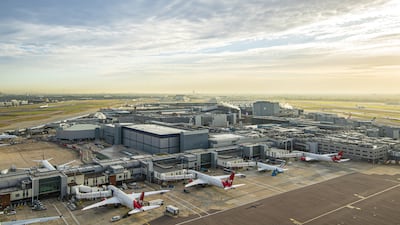Heathrow Airport in west London is set to increase passenger charges by more than half as it seeks to claw back losses incurred due to lower numbers of travellers during the pandemic.
The Civil Aviation Authority, the UK’s aviation regulator, said the cap on the airport’s price per passenger would be raised from its current level of £19.60 to £30.19 on January 1.
Charges are paid by airlines but are generally passed on to passengers in air fares.
The CAA said the increase “reflects the uncertainty of the recovery of passenger volumes at the airport from the pandemic, particularly following the emergence of new information about the Omicron variant of Covid-19”.
Since Omicron was first detected in the UK last month, the Conservative government has imposed new travel restrictions, including testing requirements that are likely to deter people from travelling.
Airlines and travel companies have criticised the approach and urged ministers to drop the measures to help the sector recover from the coronavirus crisis.
The cap will move up or down depending on factors such as passenger numbers and commercial revenue.
After Heathrow received permission from the CAA to charge airlines more, Britain’s busiest airport said it was disappointed with the figure. The revised figure may not be enough to support Heathrow to improve passenger services, the airport said.
“We are extremely disappointed in this interim decision from the CAA,” a spokesman said.
“It relies on rushed analysis and will undermine passenger experience at the UK’s hub airport.
“As an example, the CAA’s flawed analysis assumes that operating costs at Heathrow next year will be £173 million [$230m] lower than our budget.
“This is even lower than we were able to achieve in 2020, when we served half as many passengers with only one runway and two terminals operating and the benefit of a government furlough scheme.
“There are material and basic errors in many aspects of the CAA’s assessment.
“Uncorrected, this risks leaving Heathrow without sufficient cash flow to support investment in improving passenger service and resilience.”
Heathrow said in September its losses from the pandemic had stretched to £3.4 billion.
Passenger numbers are around 40 per cent of pre-pandemic levels.
Luis Gallego, chief executive of the International Airlines Group, which owns British Airways, said the company was disappointed with the CAA’s decision.
IAG declined to confirm if it would follow through on a threat it made last month to cut flights from Heathrow if passenger prices rose by more than half.
In a statement issued after the announcement on Thursday, Mr Gallego said increasing charges could backfire on Heathrow while the UK’s travel industry tries to get back on its feet more than 18 months since the pandemic grounded flights.
“The UK’s economic recovery depends on its ability to compete on the global stage,” he said.
“Heathrow is already 44 per cent more expensive than its European competitors.
“The reality is around 40 per cent of Heathrow passengers are connecting to other destinations and could easily travel via other European hubs.
“After the worst crisis in aviation history, we need to attract demand to stay competitive. Hiking charges will have the opposite effect. Britain will become not more competitive, but less.
“A cost-efficient Heathrow would benefit UK consumers, businesses and trade. Global Britain needs a global and competitive hub”.










